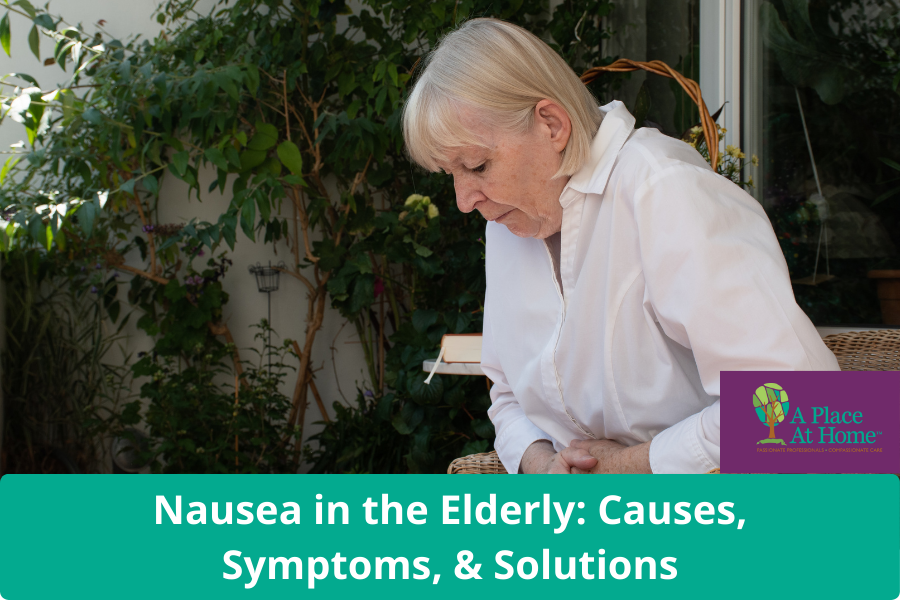
Nausea is a frequent concern among older adults and often signals an underlying health issue that should not be ignored. For seniors, nausea may stem from medication side effects, chronic conditions, or age-related digestive changes.
When caregivers understand the potential causes and recognize the warning signs, they are better equipped to provide timely relief and support for their aging loved ones. Families who notice ongoing nausea may also benefit from professional in-home care services, where trained caregivers can monitor health changes, prepare balanced meals, and provide the daily support seniors need to remain safe and comfortable at home.
What is Nausea and Why Does It Affect the Elderly?
Nausea is not an illness but a sensation of discomfort in the upper abdomen or stomach. This unpleasant feeling often creates an urge to vomit and may be accompanied by dizziness, lightheadedness, weakness, or increased salivation.
Although two out of three seniors experience nausea at some point, it is not a natural part of aging. Instead, nausea in the elderly usually indicates an underlying health concern that requires attention.
Common Causes of Nausea in the Elderly
Nausea in seniors can develop from many factors, ranging from minor digestive issues to serious chronic illnesses. Recognizing the most common causes helps caregivers address the problem early and ensure seniors receive the right care.
1. Medication Side Effects in Older Adults
Certain prescription and over-the-counter drugs can trigger nausea in seniors. Antibiotics may upset the stomach by killing good bacteria. Antidepressants, nonsteroidal anti-inflammatory drugs (NSAIDs), and some pain medications also commonly cause nausea in older adults.
2. Dehydration and Nausea in Seniors
Older adults often experience a diminished thirst response, putting them at risk for dehydration. Insufficient fluids slow digestion, lower blood pressure, and contribute to dizziness — all of which can lead to nausea.
3. Mental Health and Nausea in Aging Adults
Stress, anxiety, and depression can affect the digestive system and cause nausea in the elderly. For example, chronic stress triggers hormones that disrupt gut function, while depression alters serotonin levels that regulate both mood and digestion.
4. Chronic Diseases and Nausea in Seniors
Conditions like diabetes, heart failure, kidney disease, and liver problems may all cause nausea. For instance, diabetic gastroparesis slows stomach emptying, leading to nausea after meals. In some cases, diabetes medications themselves list nausea as a side effect.
5. Motion Sickness in the Elderly
Age-related changes in vision, balance, and coordination make seniors more vulnerable to motion sickness. Conflicting sensory signals can confuse the brain and trigger waves of nausea during travel.
6. Digestive System Changes with Age
As people age, the stomach may empty more slowly and produce less stomach acid. These digestive changes can make it harder for seniors to process meals and may cause discomfort, bloating, or nausea after eating.
Other Potential Triggers of Nausea
- Gastrointestinal disorders such as ulcers, GERD, or gallbladder disease
- Infections like the flu or food poisoning
- Side effects from cancer treatments or anesthesia

What Are the Symptoms of Nausea in Older Adults?
Nausea in the elderly can present in several ways, and symptoms may range from mild discomfort to serious health concerns. Recognizing these signs early allows caregivers to provide relief and seek medical attention when necessary. In many cases, families choose to rely on personal care services to ensure their loved one receives proper support with daily needs while monitoring changes in health.
Common symptoms of nausea in older adults include:
- Persistent urge to vomit – Seniors may feel ongoing stomach upset, with or without actual vomiting.
- Loss of appetite – Many elderly individuals eat and drink less, which can lead to dehydration, unintended weight loss, and malnutrition.
- Abdominal discomfort – Stomach pain, cramping, or bloating often accompany nausea.
- Dizziness or lightheadedness – Seniors may feel as though their surroundings are spinning, which increases the risk of falls.
- Weakness and fatigue – Ongoing nausea can drain energy and leave older adults unusually tired.
- Blood pressure changes – Some seniors experience nausea alongside sudden spikes or drops in blood pressure.
Because these symptoms can overlap with other age-related health issues, caregivers should pay close attention to how often they occur and whether they worsen over time. Persistent nausea or related symptoms in seniors should be evaluated by a healthcare professional.
How to Relieve Nausea in the Elderly: Remedies and Caregiver Tips
1. Over-the-Counter Medicines
Antacids such as Tums or Rolaids neutralize stomach acids and may provide fast relief. Antihistamines help with motion sickness, while Pepto-Bismol can ease digestive discomfort. Always consult a doctor before giving seniors any medication.
2. Ginger for Nausea
Ginger tea, ginger ale, or ginger supplements are natural remedies that block nausea-causing neurotransmitters. Caregivers should confirm with a physician before introducing ginger, as it can interact with certain medications.
3. Peppermint for Relief
Peppermint similarly reduces nausea by relaxing the muscles in the gastrointestinal tract and blocking the serotonin receptors that trigger nausea. Offer the senior peppermint tea or let them suck on peppermint candies. Inhaling peppermint essential oils also provides relief from nausea.
4. Hydration and Nutrition
Encourage seniors to drink plenty of fluids, including water, broths, and herbal teas. Offering bland foods such as crackers, bananas, or toast can help settle the stomach. Small, frequent meals are easier to tolerate than three large meals.
5. Doctor’s Visit
Nausea that is persistent and accompanied by fever or weakness should prompt a visit to the senior’s healthcare provider. Also, see a doctor if the older adult cannot keep food or liquids down and vomits more than three times per day. The physician may prescribe anti-nausea medicines.

Elderly Home Care from A Place At Home – Palmetto
Seniors who experience nausea often need extra care and support at home to stay comfortable and healthy. At A Place At Home – Palmetto, our caregivers are committed to promoting the safety and well-being of older adults while providing practical solutions to ease nausea in the elderly. Our team prepares nutritious meals and hydrating beverages to help prevent nausea and dehydration, and we adapt menus to meet specific dietary requirements. When nausea is persistent, our caregivers provide transportation and escort to medical appointments so seniors receive the professional care they need.
We also deliver comprehensive elderly care services that improve daily living, including personal assistance with bathing, dressing, and toileting. Light housekeeping helps maintain a safe, clean home environment, while fall prevention measures, such as removing clutter, reduce risks for seniors who may feel dizzy or weak from nausea. Companionship is another important part of our care. Our caregivers engage seniors in meaningful conversations, hobbies, games, and outings to reduce stress and loneliness, two factors that can worsen nausea in older adults.
Whether your loved one needs 24-hour support, overnight care, or flexible hourly services, the compassionate caregivers at A Place At Home are here to help. Contact us today to schedule a free in-home consultation and learn how we can provide reliable support for seniors experiencing nausea and other health challenges in Palmetto, FL, and the nearby areas.
Frequently Asked Questions (FAQs) About Senior Nausea
Can dehydration cause nausea in older adults?
Yes. Dehydration is a leading cause of nausea in seniors because it slows digestion, lowers blood pressure, and increases dizziness, all of which can trigger stomach upset.
Which medications commonly cause nausea in the elderly?
Antibiotics, antidepressants, pain relievers (NSAIDs), and some heart or diabetes medications often list nausea as a side effect for seniors.
How does aging affect the digestive system and increase nausea?
With age, the stomach may empty more slowly and produce less acid, making digestion harder. These changes, along with other health conditions, increase the likelihood of nausea in older adults.
What foods help reduce nausea in seniors?
Bland foods such as bananas, rice, applesauce, toast, and crackers can settle the stomach. Broths, clear fluids, and herbal teas also help with hydration and nausea relief.






